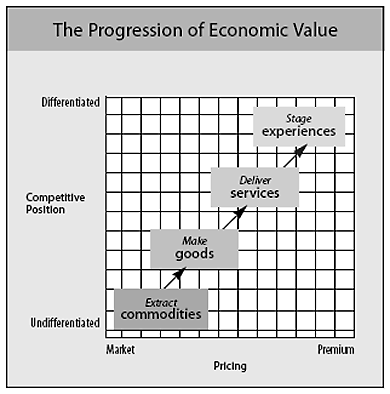So what is exactly this so-called “Age of Experience”?
Looking back, 1998 was an important and eventful year. Madonna topped music charts, France beat Brazil in a memorable World Cup final held in Paris, and Bill Clinton issued the most famous denial in history.
Additionally, Joseph Pine II and James H. Gilmore published an article in the Harvard Business Review where they instigated the term ‘the experience economy’. In that article, the authors outlined what they anticipated as the next economic era following on from the agrarian, industrial, and service economies.
In this new economy, businesses would no longer try to sell products or services, but memories and experiences. Almost 2 decades on from that article, it appears that the author’s predictions are coming to fruition.
The Power of the Consumer
Consumers today are more scrutinizing than ever before. With a few taps of their screen, they can bash your company, products, and services and share that opinion with their friends and family instantaneously.
Therefore, whenever a consumer is interacting with your business, your brand is at risk. In 2018, famous Hollywood Star Kylie Jenner tweeted her displeasure with Snapchat following user interface adjustments.
The aftermath? Snapchat’s parent company, Snap, reported a 7% knock on its shares, wiping out $1.3 Billion of its market value. Users flocked to other social media services and Snapchat hasn’t recuperated since.
All it takes is 1 disappointed customer, 1 negative opinion, 1 bad experience.
Experience Businesses Today
Today’s forward-thinking brands understand the need to continually innovate. Transform and adapt in order to stay relevant in this constantly evolving market.
Brands that focus on making the customer feel immersed in the experience are much more likely to improve customer satisfaction, develop brand loyalty, and acquire new customers.

Forbes describes the customer experience as the “cumulative impact of multiple touchpoints”.
In today’s hyper-competitive market, companies are finding it harder and harder to differentiate themselves as products and services are standardized and imitated. In that respect, the Customer Experience is proving to be a vital strategy for brands looking to develop a competitive advantage.
OPINATOR, guiding you through the Age of Experience
Our clients are differentiating themselves with the help of innovative customer experience programs. OPINATOR’s platform include fun, interactive forms, and surveys. Now there are interactions capturing customer’s imagination, in a way never seen before.
Therefore, they are witnessing huge spikes in response rates (up to 10X!) after implementing emotionally engaging and aesthetically pleasing user interfaces. Branding elements such as images or videos, strengthen brand loyalty and amplify brand awareness.
By George Ghorayeb

